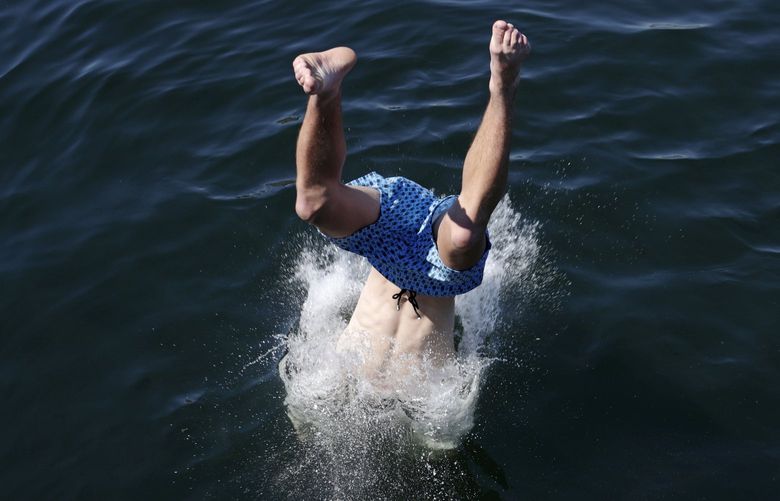The heat is here, and overnight temperatures across Western Washington this week will do little to keep a leash on soaring daytime highs.
As highs stretch into the 80s and 90s, overnight low temperatures through Wednesday are not expected to fall much below 65 degrees, according to the National Weather Service, which deemed it “the hottest week of the year so far.”
Around 3:50 a.m. Monday, the temperature at Seattle-Tacoma International Airport was a balmy 75 degrees, the weather service said. High temperatures reached about 93 degrees by around 4 p.m.
Tuesday’s high is forecast to be 89 degrees in downtown Seattle, dropping to 69 degrees at night.
The weekend should bring some reprieve from the hot sun, with “near normal” temperatures, according to the weather service.
Until now, the Pacific Northwest has largely been spared from the extreme heat affecting much of the southern United States this summer.
Many parts of Eastern Washington will reach temperatures above 105, and lower-elevation areas of Western Oregon could have one of their hottest five-day stretches on record.
Seattle won’t be as hot, and this heat wave won’t be nearly as unbearable as those in the last couple of years — particularly in 2021, which saw fatal, record-breaking highs over 100 degrees. But for those without a way to cool off, it could still be dangerous.
Whether during the day or at night, some best practices when it comes to heat include staying hydrated and never leaving pets or children unattended in cars, the weather service said.
Here are some additional tips, including some from the Washington Department of Health and the Centers for Disease Control and Prevention, to keep cool as temperatures soar:
- Stay in air-conditioned buildings as much as you can. Air-conditioning is the number one way to protect yourself against heat-related illness and death. If your home is not air-conditioned, reduce your risk for heat-related illness by spending time in public facilities that are air-conditioned and using air conditioning in vehicles. Many Seattle public libraries are air-conditioned.
- Find a cooling center near you. Cooling centers can help protect people from heat-related illness and other complications caused by hot weather. Many cooling centers are set up across the region and are free to the public during heat events. Dial 2-1-1 or use the statewide online resource to find cooling centers near you.
- Keep the sun outside. Close blinds and drapes completely on the sunny south and west sides of your dwelling, as direct sun can increase the temperature of a room by more than 10 degrees.
- Get creative. Wet a thin towel or sheet, and squeeze out any excess water. Hang it directly in front of an open window. Warm air passes through the material causing the water to evaporate and the air to cool. Grab some gel ice packs, freeze them, put them in pillowcases and place at strategic points — under your neck, knees, wrists. Before you go to sleep, you can also put a couple of bottles of frozen water, or a bowl of ice water, in front of the fan that’s aimed at your bed.
- Turn off and unplug every electrical appliance you can. You should also limit use of the stove and oven. They will make you and your house hotter.
- Limit your outdoor activity, especially during the hottest parts of the day. It’s also important to pace yourself. Start activities slowly and pick up the pace gradually.
- Drink more water than usual. Don’t wait until you’re thirsty to drink more. Muscle cramping can be an early sign of heat-related illness.
- Wear lightweight, loosefitting clothing.
- Take cool showers or baths to cool down. Then, one or two hours before bed, take a hot shower or bath. It may seem counterintuitive, but science shows that the body has a physiological need to cool down a couple degrees in order to sleep. The hot water creates a circumstance that allows your body temperature to drop even if your sleep environment remains hot.
- Keep pets safe and make sure they have protection from heat. If you’re walking your pet, walk on grass instead of asphalt, which can burn your pet’s paws
- Avoid extreme temperature changes. Warm temperatures do not necessarily mean warm water. Rivers and lakes are still very cold this time of year, and jumping into cold open water can result in shock, arrhythmias and drowning, according to the Washington State Department of Health. Follow water safety tips, like wearing a life jacket that fits you, if you go swimming or boating.
Information from The Seattle Times archive was included in this report.

The opinions expressed in reader comments are those of the author only and do not reflect the opinions of The Seattle Times.